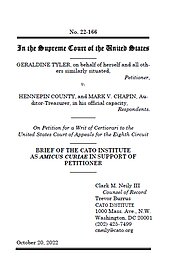Learn more about Cato’s Amicus Briefs Program.
Geraldine Tyler, a 93-year-old woman on a very limited income, owned a condominium in Minnesota worth $40,000. She was unable to pay her $2,300 property tax bill, which eventually turned into nearly $12,700 with interest and fees, and Hennepin County seized and sold her property to pay the bill. Yet rather than just keeping the $12,700 that was owed and returning the rest, the county kept the entire $40,000 from the sale. In most states, when someone does not pay their property taxes, the government may take the property, sell it to pay off the tax debt, and then return whatever is left back to the property owner. But in fourteen states, including Minnesota, the government can keep the entire value of the property. This often impacts the poor and elderly, like Ms. Tyler, who often own their homes free of a mortgage but do not have enough discretionary income to pay their property taxes.
After Hennepin County sold her home, satisfied her tax debt, and kept the surplus $25,000 in equity, Ms. Tyler sued, arguing that the county unconstitutionally took her property without compensation in violation of the Takings Clause of the Fifth Amendment. Her case went up to the Eighth Circuit, but that court said Hennepin County did not take her property because Minnesota law declared that the home equity was not Ms. Tyler’s private property.
Ms. Tyler, who is represented by the Pacific Legal Foundation (PLF), has petitioned the U.S. Supreme Court to hear her case. The Court requested Hennepin County to respond to Ms. Tyler’s petition, indicating a strong interest in the case. The Court also requested a response in Fair v. Continental Resources, another case filed by PLF over whether government can keep surplus equity.
Cato has filed an amicus brief in Tyler, as we did in Fair, which came out of similar situation in Nebraska. The brief argues the Eighth Circuit erred in holding that Ms. Tyler did not have a property right in her remaining equity because Minnesota Supreme Court decisions had long held that excess equity after a tax sale is private property. Under the Eighth Circuit’s reasoning, even the smallest debt could justify the government taking an entire property and keeping the full value. This is against historical tradition as well as the fairness and justice embodied by the Takings Clause.
The Court should take Tyler’s case and correct the fourteen states that allow these unconstitutional takings. This taxation policy is oppressive, and nobody should lose her entire home and the equity because she couldn’t pay $2,300 in taxes. Hennepin County is taking from the poor to feed its own coffers. This is unconstitutional and the Supreme Court should stop it.

This work is licensed under a Creative Commons Attribution-NonCommercial-ShareAlike 4.0 International License.


